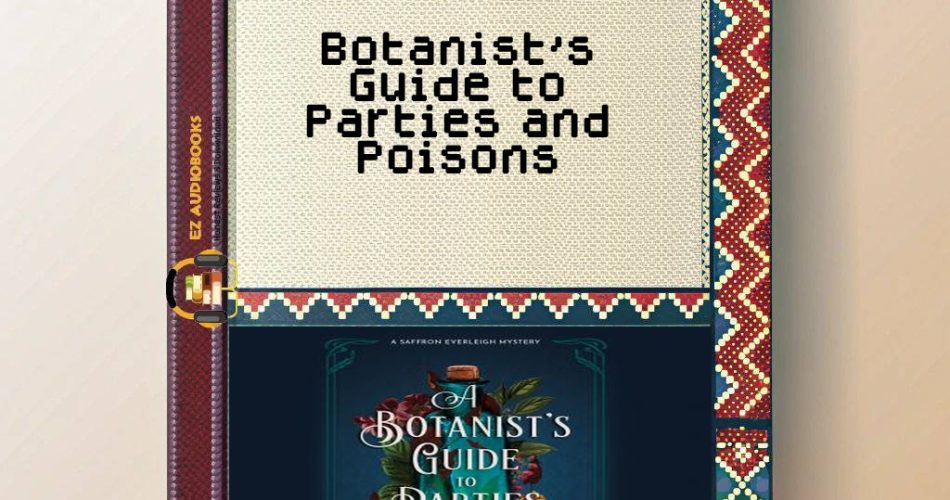Audiobook Sample
Listen to the sample to experience the story.
Please wait while we verify your browser...
- Title: Botanist’s Guide to Parties and Poisons
- Author: Kate Khavari
- Narrator: Jodie Harris
- Length: 08:12:00
- Version: Abridged
- Release Date: 07/06/2022
- Publisher: Dreamscape Media, LLC
- Genre: Mystery, Thriller & Horror, Detective Stories, Historical
- ISBN13: 9.78E+12
As I settled into my favorite armchair with a cup of oolong tea, the opening strains of Jodie Harris’s narration transported me to 1923 London with such vivid clarity that I could almost smell the damp earth of the university greenhouses and hear the rustle of starched academic gowns. Kate Khavari’s debut novel, “A Botanist’s Guide to Parties and Poisons”, offers listeners a richly layered historical mystery that resonates deeply with my own experiences navigating male-dominated academic spaces.
What fascinates me most is how Khavari uses the murder mystery framework to explore the thorny terrain of gender dynamics in early 20th century academia. Our protagonist, Saffron Everleigh, Britain’s first female research assistant at University College London, faces challenges that echo my own early career struggles – though thankfully without the poisoned cocktails. The scene where Saffron’s botanical expertise is dismissed by her male colleagues reminded me painfully of my first literature symposium at Harvard, where a senior professor interrupted my presentation to ‘explain’ my own research topic back to me.
Through a cultural lens, Khavari’s novel brilliantly juxtaposes the refined world of academic dinner parties with the brutal realities of institutional sexism. The poisonings serve as a potent metaphor for the toxic environments women in STEM (and humanities) have historically endured. This thematic depth elevates what could have been a conventional whodunit into a sophisticated commentary on power structures – reminding me of how Donna Tartt’s “The Secret History” uses murder to explore class dynamics in academia.
Jodie Harris’s narration is nothing short of masterful. Her ability to shift seamlessly between Saffron’s determined intelligence, Alexander Ashton’s playful charm, and the various stuffy professors’ pomposity creates an immersive listening experience. Harris particularly shines in the greenhouse scenes, where her whispered descriptions of exotic plants create an almost ASMR-like sensory experience. The scene where Saffron examines the poisoned leaves had me leaning forward, holding my breath alongside her.
The audiobook’s pacing deserves special praise. At 10 hours and 15 minutes, the production maintains perfect tension between botanical detail and plot momentum. The scenes in the Amazon expedition archives particularly stood out, with Harris’s measured delivery allowing Khavari’s lush descriptions of pressed specimens and colonial-era field notes to breathe. This reminded me of my time researching in Oxford’s Bodleian Library, where crumbling expedition journals similarly whispered stories of forgotten scientific rivalries.
From a literary theory perspective, Khavari employs an interesting narrative structure that mirrors botanical classification systems – each clue carefully labeled and categorized like specimens in a herbarium. The mystery unfolds with the precision of a scientific experiment, though some listeners might find the middle section’s detailed plant descriptions slow. Personally, I found these passages meditative, much like my experience reading Andrea Wulf’s “The Invention of Nature” while listening to rainforest sounds.
Compared to similar historical mysteries like Deanna Raybourn’s Veronica Speedwell series, Khavari’s work offers a more academically rigorous portrayal of Edwardian science culture. The research underpinning the poison lore is impeccable – I actually paused several times to verify some of the more fascinating botanical facts (all checked out!). This scholarly attention to detail makes the novel particularly satisfying for listeners who appreciate authenticity in their historical fiction.
If I were to offer one critique, it would be that some secondary characters lean toward archetypes – the jealous female rival, the crusty-but-kind mentor. However, Harris’s nuanced vocal performances add surprising depth to even these familiar types. And let’s be honest – what academic hasn’t encountered their fair share of archetypal colleagues?
For potential listeners, I’d recommend this audiobook particularly for:
– Fans of intelligent historical mysteries with feminist themes
– Those who enjoyed “The Anatomist’s Wife” by Anna Lee Huber
– Listeners who appreciate scientifically accurate period details
– Anyone who’s ever had to prove their worth in an unwelcoming professional environment
The production quality is excellent throughout, with crisp audio that does justice to both Harris’s performance and Khavari’s prose. There’s a particular scene where rain patters against the greenhouse glass while Saffron makes a crucial discovery – the sound design in this moment is so evocative it gave me goosebumps, much like my first encounter with Kazuo Ishiguro’s “Never Let Me Go” during a thunderstorm.
As the story reached its conclusion, I found myself both satisfied by the mystery’s resolution and wistful to leave Saffron’s world. Khavari has created a protagonist whose intellectual journey feels genuinely important, and Harris’s narration makes her feel like a friend by the final chapter. The novel’s exploration of how women claim space in traditionally male domains resonates powerfully in our current moment of reckoning with institutional inequities.
With scholarly admiration and a renewed appreciation for botanical mysteries,
Prof. Emily Chen

